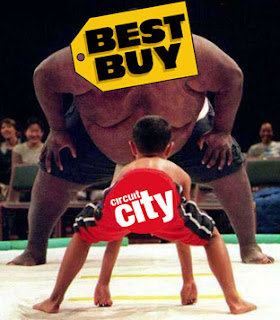 After months of rebuffing a buyout from Blockbuster, the consumer-electronics retailer effectively put itself up for sale, allowing the video-rental chain and its largest shareholder, Carl Icahn, to review its books.
After months of rebuffing a buyout from Blockbuster, the consumer-electronics retailer effectively put itself up for sale, allowing the video-rental chain and its largest shareholder, Carl Icahn, to review its books. By BusinessWeek
Circuit City is finally throwing in the towel.
Confronted with weak sales, impatient shareholders and a pummeled consumer, the electronics chain has capitulated and retained Goldman Sachs to help negotiate a deal.
Circuit City also headed off a potentially nasty proxy fight with activist investor Mark Wattles by agreeing to nominate three of the investor's candidates to its board.
The moves, made earlier this month, almost certainly presage a sale of Circuit City Stores (CC, news, msgs), likely to Blockbuster (BBI, news, msgs), where Carl Icahn has stepped up and agreed to finance a Circuit City acquisition.
Icahn, Blockbuster's largest shareholder -- has bought into a "game-changing" scheme announced last month in which the troubled electronics retailer would be combined with the troubled movie retailer to create a new national chain selling consumer hardware and software.
Wall Street is dubious, and no other buyers have emerged wanting Circuit City.
"(There's) a lack of potential bidders beyond Blockbuster," says Matthew Fassler, an electronics retail analyst at Goldman Sachs (GS, news, msgs).
There are numerous reasons buyers beyond Icahn are not lining up. Circuit City is in an extremely competitive business with heavy pressure from Wal-Mart Stores (WMT, news, msgs).
At the same time, Circuit City comes saddled with 682 locations, many of which are in poor and underperforming areas, a fact that CEO Philip Schoonover often refers to when discussing his company's poor performance.
"While the Circuit City board has confidence in the company's ability to successfully implement its turnaround plan and generate shareholder value, we believe that we can best serve the interests of our shareholders by exploring all possible alternatives to enhance shareholder value," Schoonover said May 9.






